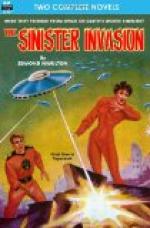He stopped at the open door. He heard Jill’s voice saying anxiously, “But I’m sure he’d have come to make certain I was safe!” A pause. “There’s no one else left, and I want....” Another pause. “But he was up on the mountainside! At least a helicopter could—”
Lockley called, “Jill!”
He heard a gasp. Then she said unsteadily, “Someone just called. Wait a moment.”
She came to the door. At sight of Lockley her face fell.
“I came to make sure you were all right,” he said awkwardly. “Are you talking to outside?”
“Yes. Do you know anything about—”
“I’m afraid I do,” said Lockley. “Right now the important thing is to get you out of here. I’ll tell them we’re starting. All right?”
She stood aside. He went up to the short wave set which looked much like an ordinary telephone, but was connected to a box with dials and switches. There was a miniature pocket radio—a transistor radio—on top of the short wave cabinet. Lockley picked up the short wave microphone. He identified himself. He said he’d come to make sure of Jill’s safety, and that he’d been passed by the rushing mass of cars and trucks that had evacuated everybody else. Then he said, “I’ve got a car about four miles away. It’s in a ditch, but I can probably get it out. It’ll be a lot safer for Miss Holmes if you send a helicopter there to pick her up.”
The reply was somehow military in tone. It sounded like a civilian being authoritative about something he knew nothing about. Lockley said, “Over” in a dry tone and put down the microphone. He picked up the pocket radio and put it in his pocket. It might be useful.
“They say to try to make it out in my car,” he told Jill wryly. “As civilians, I suppose they haven’t any helicopters they can give orders to. But it probably makes sense. If there are some queer creatures around, there’s no point in stirring them up with a flying contraption banging around near their landing place. Not before we’re ready to take real action. Come along. I’ve got to get you away from here.”
“But I’m waiting....” She looked distressed. “He wanted me to leave yesterday. We almost quarrelled about it. He’ll surely come to make sure I’m safe....”
“I’m afraid I have bad news,” said Lockley. Then he described, as gently as he could, his last talk with Vale. It was the one which ended with squeaks and strugglings transmitted by the communicator, and then the smashing of the communicator itself. He didn’t mention the puzzling fact that the communicator had stayed perfectly aimed while it was picked up and squeaked at and destroyed. He had no explanation for it. What he did have to tell was bad enough. She went deathly pale, searching his face as he told her.
“But—but—” She swallowed. “He might have been hurt and—not killed. He might be alive and in need of help. If there are creatures from somewhere else, they might not realize that he could be unconscious and not dead! He’d make sure about me! I—I’ll go up and make sure about him....”




